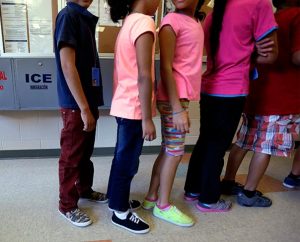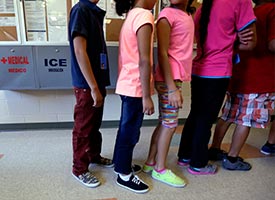By Roger Drinnon
A mother and father of an El Salvadoran child left their son with his grandfather, as the parents braved a treacherous journey to the U.S. border — which involved dangerous travel and even more dangerous people.
Their hope was to work in the U.S. and earn enough money to pay for their son to flee the violence-plagued country with safer travel. Not long after they left, the grandfather was killed in gang-related crossfire, so with the help of an aunt, the boy fled to the U.S. sooner than expected, facing all the journey’s dangers alone.

This was one of several accounts heard by participants in the International Lutheran Roundtable: “A Lutheran Response to the Exodus of Children and Families from Central America,” which took place Oct. 28-29 near Houston. They included Lutheran leaders from the United States, Guatemala, Honduras, El Salvador, Mexico and Nicaragua; representatives from various partner organizations involved in the response to the current immigration crisis; and regional experts.
Media reports draw national attention to the crisis on the border, where tens of thousands of Central American children and minors are entering the U.S. without a parent or guardian and without lawful immigration status.
Many are fleeing the violence in their home countries brought about by Maras — organized criminal gangs that have undermined governments and the rule of law in nations like Honduras, Guatemala and El Salvador. Some of these young refugees faced forced recruitment into the Maras and others were prone to human trafficking and other abuses.
The day before the event, roundtable participants visited government facilities and charitable organizations currently assisting immigrants. Government officials provided an overview of the U.S. immigration system, and current policies and practices in relation to the crisis. Officials explained how after the young immigrants are found by border agents, they are normally handed over to the Department of Health and Human Services’ Office of Refugee Resettlement (ORR) for assistance in reuniting with family members and in beginning the legal process for U.S. citizenship.
During a visit to a Texas ORR facility, officials related some notable statistics based on 2013 data: 30 percent of youth immigrants were from Honduras; 27 percent were from Guatemala; 26 percent from El Salvador; 3 percent from Mexico; 2 percent from Ecuador; and 2 percent from various other countries. Officials said these demographics can vary over time, but the overall numbers underscore serious, unresolved problems among the immigrants’ countries of origin.
With few missionaries in the region, the LCMS has supported the Lutheran Church of Canada’s mission work in Central America while also enabling Recognized Service Organizations like Lutheran Social Services of the South (LSSS) and other partners to respond to the immigration crisis.
One example is the New Hope Emergency Shelter in McAllen, Texas, which serves up to 60 children at a time. The facility further expands LSSS’ ministry to provide food, clothing, medical and spiritual care, and case management to the mostly Central American immigrant children when they arrive in Texas. LSSS also operates a 120-bed emergency shelter and transitional foster-care facility in Corpus Christi and a transitional foster-care facility in El Paso. LSSS works closely with the ORR to help children begin new lives through care in the organization’s foster homes.
“We are so thankful for our partnership with the LCMS to help make this ministry expansion possible,” said Mark Minick, LSSS senior vice-president for External Relations. “[LCMS congregations’] generosity and support ensure the spiritual and physical needs of God’s children in a warm and nurturing environment.”
“It was a blessing to listen to, learn from and dialog with Lutheran leaders from around the world – the representatives from Central America and Mexico enlightened us about the crisis that has existed south of our border for many years,” said the Rev. Michael Newman, director of missions for the Synod’s Texas District. “The current LCMS partnership with LSSS is helping to break the cycle of abuse and to stem the tide of trauma migrant children are experiencing,” he said. “Collaboration with Lutheran Immigration and Refugee Service (LIRS) and other caring agencies around the nation and world will help shine the Gospel light in the public square and serve the least of these with the love of Christ.”
Lutheran World Relief (LWR) also is working to address some of the root causes of the crisis while also assisting young immigrants who are sent back to their home countries.
“LWR has worked in Central America since 1972, addressing some of the root causes of [the current migration from Central America] by working to improve rural families’ incomes and livelihoods,” said Carolyn Barker-Villena, LWR senior director for Latin America. “With both our ongoing efforts to address the root causes of migration as well as a more immediate response to support the children who are being returned to their countries of origin, LWR seeks to prevent or minimize the negative and often traumatic impacts that migration can have on families.”
The roundtable was convened by Lutheran Immigration and Refugee Service with the support of an international planning team. As the national organization established by Lutheran churches to serve uprooted people, LIRS has 75 years of expertise serving refugees in the United States, including providing care for unaccompanied refugee and migrant children from Central America.
Roger Drinnon is manager of Editorial Services for LCMS Communications.
Posted Nov. 21, 2014
